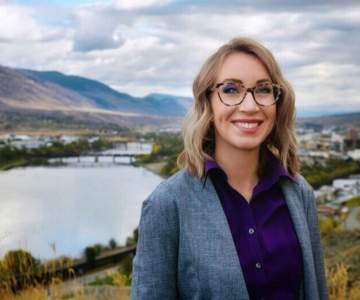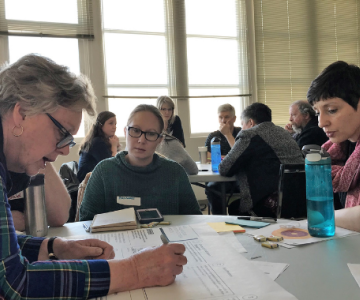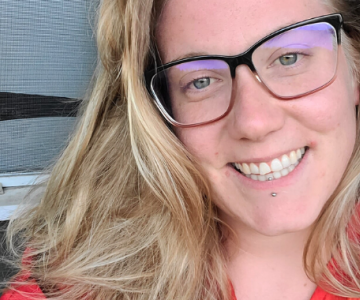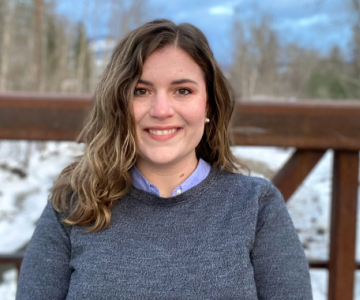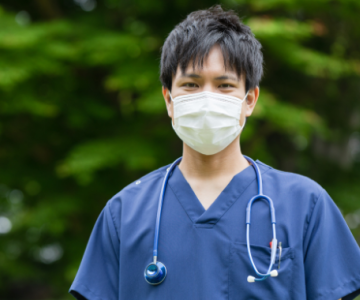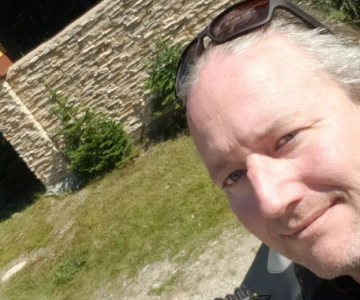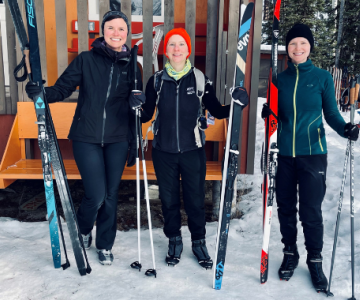Breadcrumb
Explore Stories
Community & Culture
Medical Health Officer Dr. Carol Fenton
We know that representation matters in health care. Women hold a number of key leadership roles at IH including CEO, members of the IH board of directors, and chiefs of staff. In addition, 1,091 of the physicians with privileges at IH health-care facilities are women.
But, even with women taking an increasing role in leadership, gender bias can still be an issue.
“Before I understood how gender bias can affect referrals to medical specialists, I was definitely guilty of unconsciously perpetuating this practice,” says Dr. Shauna Tsuchiya, a physician at Royal Inland Hospital.
Dr. Tsuchiya learned that identifying as female does not automatically equate to practising female gender equality in the workplace.
“I now challenge myself and others to recognize and learn about gender biases that exist in clinical medicine and medical leadership,” she says.
Dr. Shauna Tsuchiya, a physician at Royal Inland Hospital
Medical Health Officer Dr. Carol Fenton appreciates being a member of a diverse team that recognizes gender equity as an important determinant of health. Dr. Fenton advocates for family-friendly policies—such as protected bicycling infrastructure, on-site childcare, as well as equal sharing of parental leave and domestic duties in every family.
“These types of family-friendly policies and individual choices reduce the burdens and barriers for women to succeed,” she says.
In his leadership role with physician engagement, Dr. Harsh Hundal sees a diverse workforce as fundamental to creating a strong and successful team. As the medical profession becomes more diverse, he sees a shift away from approaching solutions with a ‘we know what’s best’ mentality, towards employing a listen, learn, and co-design mindset.
“I am grateful to the articulate, thoughtful and authentic female leaders who have moved into leadership positions, thereby bringing inclusive voices to the conversation,” says Dr. Hundal. “The key is creating a community of leaders that supports each other, and accepts and learns from each other that there are different and equally valid ways of leading.”
Interior Health is proud to participate in International Women’s Day on March 8 and help #BreakTheBias. Celebrate women's achievement. Raise awareness against bias. Take action for equality.
Learn more on the IWD website
Community & Culture
Are you wondering how to stay up to date on the latest news about COVID-19, or services in your community?
New information is always being added to InteriorHealth.ca. The best way to stay in the know is to sign up for stories and updates that are delivered right to your inbox.
Check out our easy subscription options!
Stay Connected
Research & Innovation
Pictured above: a 2019 community workshop on extreme heat
It might feel like the middle of winter, but Interior Health's Healthy Communities team is hard at work helping communities prepare for the extreme heat of summer.
The interior region of B.C. is home to some of the hottest communities in Canada. Current research tells us that temperatures will continue to rise, and extreme heat events will last longer in the future.
Although each community had a different experience, the June 2021 'heat dome' impacted all of us. Extremely hot temperatures lasted for several days, and overnight temperatures remained high, offering little relief from the heat. Times like these of intense heat with no break can have many negative impacts on health, particularly for elderly people and those with existing chronic conditions. Preparing in advance for these extreme heat events will help to keep people in our communities healthy and safe during extreme weather.
Community partners are essential
Recent events have taught us that community partners such as local governments play a vital role when it comes to preparing communities for heat events and protecting the health of citizens.
Over the past four years, Interior Health has received grant funding from Health Canada and the Pacific Institute for Climate Solutions to work with communities and help them understand the health impacts of extreme heat.
Since 2018, Interior Health has developed and delivered workshops focused on responding to extreme heat. These community-focused workshops took place in Kelowna, Ashcroft, Osoyoos, Lytton, and Kamloops.
These community engagements resulted in the development of a Heat Alert & Response Planning Toolkit for Interior BC Communities to provide community partners with practical information and resources they can use when developing and implementing strategies to respond to extreme heat.
About the Healthy Communities program
We work with local governments, communities, school districts/schools and families in the Southern Interior for better health and well-being. Through engagement and advocacy we influence equity, public policies, physical and social environments and protecting the public. We know that it takes a collaborative effort to address the social determinants of health and other factors that keep us well, and health cannot be achieved by one sector alone.
Learn more about Healthy Communities
Health & Wellness
Family Caregivers of BC explains how caregivers can mobilize informal respite to make their role easier.
We understand the importance of relationships in our lives and the need for strong support networks. Establishing a circle of caring people or support network has been a strategy used by people in diverse cultural traditions all around the world for many years. A circle of care is especially important for someone who might be vulnerable because of health and social concerns.
Many of us have friends or informal networks that we rely on when we need advice, when we are in crisis and when we want to share and celebrate our triumphs. For many caregivers, these typical connections may not exist automatically and need facilitation. It can be difficult to describe exactly what a circle of care is or what it does because each support network is unique, and there are as many possible circle arrangements as there are circles.
Our approach at FCBC is to first support a caregiver to identify people that could be in their circle of care (including family, friends, neighbours, community members, etc.), and then guide the circle of care group to meet on a regular basis to help the caregiver maintain their wellness.
The circle of care group in essence strengthens and develops the caregiver’s informal network of support. A circle can involve two or more people who collaborate to share information and provide whatever type of support the caregiver has identified as a need. They could make follow-up phone calls, help with paperwork and bill payments, grocery shop on a specific day, walk the dog, or do laundry and cleaning.
When you are a part of a circle of care, you enter into an intimate and vulnerable space where you learn about the private aspects of a person and their care recipient’s life. In this space, vulnerabilities are exposed, fears and dreams shared, and common visions developed. The circle comprises community members and at the centre is the family caregiver. The family caregiver guides decisions about who to invite to be part of the circle and the direction in which the circle’s energy is employed.
To read the full story and find additional resources on caregiving, check out Family Caregivers of BC.
About the author:
Lycia Rodrigues is a support lead with Family Caregivers of BC. Reprinted with permission.
Community & Culture
Name: Carmen Gauthier (she/her/hers)Job Title: Patient Registration and Switchboard OperatorYears of Service: 4 yearsWorksite: Elk Valley HospitalCommunity: FernieAncestral Territory: KtunaxaAdvice to live by: If you're happy and you know it, share the love.
Going to the hospital can be stressful. That’s why Carmen goes the extra mile to make sure patients coming and leaving always see a friendly and happy face.
Working as a Unit Clerk in Patient Registration, Carmen’s job requires her to be in contact with people every day as she assists with setting up their needed appointments, and provides necessary information. As a naturally bubbly and outgoing person, she takes pride in making people smile and feel comfortable.
Carmen and co-worker
A sparkly unicorn headband to brighten your day
“Coming into a hospital is not a great time, but by being friendly and happy you can change that person’s entire day and help them be more calm and less anxious,” she says.
Carmen has always wanted to help people and make a difference in their day. Knowing she couldn’t physically become a nurse, she decided on a career in Unit Clerk/Patient Registration. The past four years of Carmen’s career at Interior Health have allowed her to be in contact with the patients daily, and help them with their care, without the need for intensive physical contact.
Just an average day at work
Born and raised in Sparwood, B.C., Carmen has always called Elk Valley her home. One of her favourite things about the area is how close-knit the community is, with people always ready to give a helping hand.
“Looking out your window every morning and seeing the mountain is also a very big bonus to living here. In the winters, being in the Elk Valley feels like you are in a Winter Wonderland which is so amazing and relaxing.”
Learn more about making a difference in the lives of patients
Health & Wellness
Life has changed in some way for everyone since the COVID-19 pandemic began. For those who work in health care, those changes have been felt both at home and at work.
In late 2020, Interior Health put together a team of nine pandemic health coordinators, who coordinate supports for people who need extra assistance to self-isolate due to COVID-19. To date, the team has supported more than 2,300 people to isolate safely.
We do everything from conducting mental health check-ins and assessments, ensuring access to food, finding suitable accommodations, to helping those with complex care needs, or safer supply assessments and connections. We also assist with getting clients back to their home communities after they’ve been hospitalized due to COVID-19.
When communities face challenges such as increased numbers of people with COVID-19 in shelters, or how to support those who are isolating during a community evacuation, our team gets called in to help. Flexibility and creativity are key aspects of the work we do.
There's no real "typical day" for a pandemic health coordinator. It all depends on what is happening in the regions we support. On average, we support 45 to 55 people in isolation each day, and the Omicron variant has certainly increased our already heavy workload.
I think that the most meaningful experience that the Pandemic Health Coordinators have had in common is the feedback we receive from the clients we support. We typically call these folks on a daily basis, trying to address and assess their needs while they’re quite unwell, all while keeping up with the referrals we are constantly receiving.
From being able to find a way to ensure a new mum who was in isolation would still be able to send her baby in NICU her milk, to ensuring folks who were medically evacuated and then discharged made their way home safely -- each of us has dozens of examples that have made this opportunity incredibly meaningful. We are health-care workers during a pandemic, supporting clients who are sick with COVID-19, and that is, in and of itself, meaningful to us.
As an immigrant to Canada, I’ve always felt a very strong sense of responsibility to give back to my community. This role has been a phenomenal exercise in this regard. I am passionate about ensuring folks who are marginalized and vulnerable have access to equitable health care, and this team and role have been integral to ensuring this. I'm incredibly grateful I've been able to help our communities respond to the pandemic.
Dr. Bonnie Henry said it at the beginning of the pandemic, and I've tried to practice it ever since: Be kind, be calm, be safe.
Now, more than ever, we need to keep up the good work we have all been doing. I encourage everyone to get vaccinated (including your booster dose), wear your mask, and follow public health guidance so that we can, hopefully in the near future, enjoy whatever our new normal will be.
About the author
Virginie Fostroy is a social worker and works with Interior Health as a regional pandemic health coordinator
Community & Culture
Royal Inland Hospital in Kamloops has just hired 28 brand new nurses, a few of whom haven't even graduated yet.
It's part of an ongoing effort to increase the numbers of nursing staff in communities where they're needed most.
“Royal Inland Hospital is a great partner and has employed many graduates in the past. We are pleased that they have streamlined the hiring process which allows nursing students to know they will have a job prior to graduation,” says Rani H. Srivastava, Dean of Nursing at Thompson Rivers University.
As part of its recruitment efforts, Interior Health works closely with education partners to reach out to graduates and offer them rewarding career opportunities after they complete their studies.
“We always look forward to welcoming new graduates
and the energy they will bring to our hospital as they take
the first steps of their health-care careers.”
~ Tracey Rannie, executive director of clinical operations at Royal Inland Hospital
Across our region, Interior Health has hired 108 nursing students who have recently or who are about to graduate during the 2021/2022 academic year.
Interested in exploring a career with us?
Careers@IH
Community & Culture
Name: Wesley Noppers (he/him/his)Job Title: Business ConsultantYears of Service: 11 yearsWorksite: Community Health & Services CentreCommunity: KelownaAncestral Territory: SylixAdvice to live by: Be a good person, surround yourself with good people, and good things will happen.
For Wesley, job fulfilment comes from knowing his work is contributing to the betterment of society versus simply contributing to the bottom line.
He has spent time working in private, non-profit, and public finance/accounting organizations, and is now a Business Consultant for Interior Health. Under the umbrella of IH’s financial services portfolio, Wesley’s role as Business Consultant is to support people and teams in IH with strategic planning, budget alignment and balancing, financial reporting and reviews, contributions to briefing notes, and other special projects as they arise.
After working with IH for more than 11 years, Wesley has many memorable experiences and proud moments, though the COVID-19 pandemic remains top of mind.
“During the COVID pandemic I have had the opportunity to work with new teams and individuals that I may never have been exposed to in the organization otherwise. It was amazing to experience everyone's passion, strength and resiliency in the face of such adversity, especially when fire season piled it on. It also provided me the opportunity to fully utilize my skill sets to assist in ensuring secure and equitable vaccine distribution, which has been one of the highlights of my career.”
An adventurer at heart, Wesley spends much of his personal time in the outdoors golfing, riding his 2009 Suzuki Gladius 650 motorcycle, ski-dooing, gardening and hiking.
Something you may not know about Wesley? He loves the bugs.
“I have an unhealthy obsession of playing with and photographing creepy crawlies like insects, arachnids and reptiles.”
When out-of-country travel normalizes, Wesley plans to explore more countries and cultures, and perhaps photograph some exotic bugs!
Have you thought about a career at IH?
Wesley nominates Jodi Fayant, Regional Biological Inventory Coordinator, to keep We Are IH going:
“Throughout the Mass Immunization campaign, Jodi's ability to pivot and respond immediately to vaccine redistribution requests was second to none! Mix that with her humour and general gusto, she was instrumental in keeping things moving. Thanks Jodi!” -Wesley Noppers
Community & Culture
Pictured above: Team "Nitro Glistening"
Okanagan residents have been putting their hearts and skiis into raising money for cardiac care recently.
The Kelowna Nordic Ski & Snowshoe Club's Stride & Glide event raised more than $48,000 for cardiac care at Kelowna General Hospital.
"The city is growing fast and that means a lot more hearts to care for at our hospital"
- Shannon ( emergency room nurse)
Learn more about heart health by checking out InteriorHealth.ca for tips on how to lead a heart-healthy lifestyle and discover heart procedures and programs in our region.
And find out how the Kelowna General Hospital Foundation is working to increase lifesaving cardiac services at Kelowna General Hospital.
-
Load More
Showing 495 of 786
Sign up for email updates
Receive news, alerts, public service announcements and articles right to your inbox.


